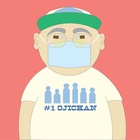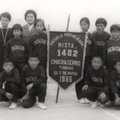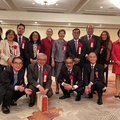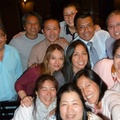On March 6, the first case of coronavirus was confirmed in Peru. 9 days later, the national government established a total quarantine that, among other measures, closed the country's borders and prevented leaving home except for essential activities such as buying food.
The measure came into force on March 16 and, in principle, would be in effect for two weeks. It was then believed that the country was going through a brief exceptional period, a forced pause, after which normality would be restored.
However, shortly after it became clear that the situation was going to last for a long time and that what seemed abnormal - maintaining a minimum distance of one meter from the rest of humanity, the use of masks, confinement at home as if it were an anti-nuclear shelter, etc.—would probably become the norm. It was necessary to act accordingly and the Nikkei community did not take long to mobilize.
The change in the board of directors of the Peruvian Japanese Association (APJ) occurred three days before the country entered confinement. Its members could not even meet in person due to the strong restrictions implemented.
Thus things are, with the country installed in the new normal. The president of the APJ, Norberto Hosaka, made the decision to carry out charitable actions to serve the most vulnerable sectors of Peruvian society.
Along these lines, the APJ organized activities such as the distribution of water in the town of Manchay and the supply of medicines and personal hygiene items to homes for the elderly.
Given the shortages that were growing due to the health and economic crisis, it was necessary to move from isolated actions to an organic initiative, and this is how the Peru Ganbare campaign was born.
As there is strength in unity, especially in a human group like the Nikkei, with a strong collective spirit, the APJ called on other institutions to join in: the La Unión Stadium Association (AELU), the Peruvian Japanese Women's Association and the Cooperatives de Ahorro y Crédito Ábaco, Aelucoop, Aopcoop and Pacífico. The unanimous response was positive.
The president of the APJ entrusted Juan Carlos Nakasone with the responsibility of leading and coordinating the actions of the campaign, leading a work team.
FROM NIPPON 2011 TO PERU 2020
In March 2011, after an earthquake devastated the Tohoku region of Japan, APJ launched the Nippon Ganbare campaign in solidarity with those affected by the disaster.
The name, then, was there. The spirit, too. They had to be taken back. The term “ ganbare ”, explains Juan Carlos Nakasone, “invites us to join forces to move forward.”
Based on the experience of nine years ago, the current campaign was called Peru Ganbare “with the idea that with a joint effort we will get ahead of this pandemic.”
The idea of joining forces behind the APJ initiative takes on particular relevance in this situation marked by the coronavirus, since personal well-being has never been so linked to collective well-being as now: by taking care of myself I take care of others.
The campaign has resulted in concrete benefits such as the supply of more than 160 m 3 of water to areas of Lima such as Manchay, Independencia, Villa María del Triunfo and Santa Rosa, as well as more than 18 tons of food.
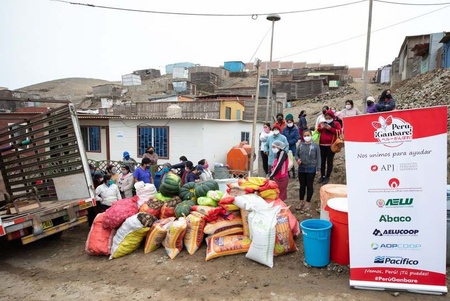
The aid has reached organizations that help the elderly, children and the poor, among other people in vulnerable situations: Monasterio Nazarenas Carmelitas Descalzas, Albergue del Adulto Mayor María Araoz, the Emmanuel Rest House (which houses members of the Nikkei community of the elderly), the Casa Magia, the Congregation of Poor Clares Franciscan Missionaries of the Blessed Sacrament, etc.
The provision of medical protective equipment (KN95 masks) has benefited medical institutions such as the Dos de Mayo, del Niño, María Auxiliadora and Loayza hospitals.
For its part, the General Volunteer Firefighters Corps has received medications to treat its members infected by the virus in the jungle city of Iquitos.
The campaign has managed to advance by dealing with the difficulties posed by the movement restrictions imposed by the quarantine and the health risk posed by interaction with other people. Social networks, the media and institutions such as the Municipality of Lima and religious congregations have been important allies.
In general terms, the campaign has had two large groups of beneficiaries: the socioeconomic sectors hardest hit by the pandemic and front-line workers (such as health personnel) in the fight against the disease.
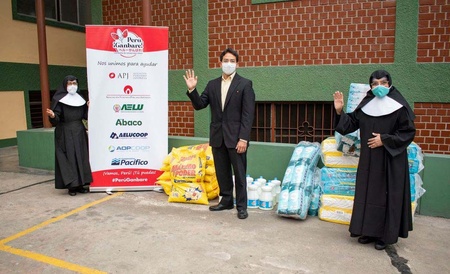
NIKKEI SOLIDARITY
Peru Ganbare is not only possible thanks to Nikkei institutions, but also to community members, individuals and families who have contributed to the campaign with donations.
“The collaborative spirit of the Nikkei community is always present and this is a value that we must preserve. In that sense, even though we are all immersed in this delicate situation, collaboration has always been present and on this occasion it has not been foreign,” explains Juan Carlos Nakasone.
Members of the Nikkei community have responded to calls from institutions to contribute. “Help us help' is the phrase we appeal for this call. Despite the difficult economic situation we are all going through, there are acts of selflessness and sharing that are appreciated in this campaign,” he adds.
The vocation for help expressed today has marked the history of Japanese immigration to Peru since its beginnings, 121 years ago. Thanks to the tanomoshi, many Japanese immigrants managed to move forward with their businesses, and cooperation made possible the creation of the Estadio La Unión Association or the newspaper Perú Shimpo, to mention just three cases that exemplify a spirit that is essential in these hard times. Well, no one defeats this pandemic alone.
Lessons can be drawn from history and their echoes still resonate. The confinement reminds Juan Carlos Nakasone of the times of war, in particular the looting of Japanese businesses in 1940, when “our ojiichan were, as a result of persecution and looting, also confined to their homes, protected by friends or families. Peruvian women who gave them shelter and food to endure the hardships of the war.”
“For us it is an experience that we never thought we would live and it is here where mutual support comes to light and the importance of being part of a community that still remains united,” he adds.
What we live today will also be history and we must rescue lessons from it. For the coordinator of the Perú Ganbare campaign, we have before us “a new opportunity to live and interact, to value our relationships outside the economic maelstrom.”
“Solidarity is a precious value (today for you, tomorrow for me) that we should not ignore. With mutual effort, great works are done,” he says.
The idea is that the campaign is not temporary and persists. As? Supporting soup kitchens or soup kitchens, which offer food to people in need, with the support of recognized institutions such as Cáritas del Perú.
On a personal note, Juan Carlos Nakasone is grateful for the opportunity to lead Perú Ganbare and the team that accompanies him, and thanks them for “keeping us healthy and for helping us continue helping.”
No matter how big a campaign tries to be, it is impossible to help everyone. The coordinator of the Nikkei initiative regrets not being able to reach more people. “It is a grain of sand in a sea of hardships and difficulties,” he says in reference to the aid. A grain of sand that, however, for a person who has little or nothing can be a salvation.
© 2020 Enrique Higa


